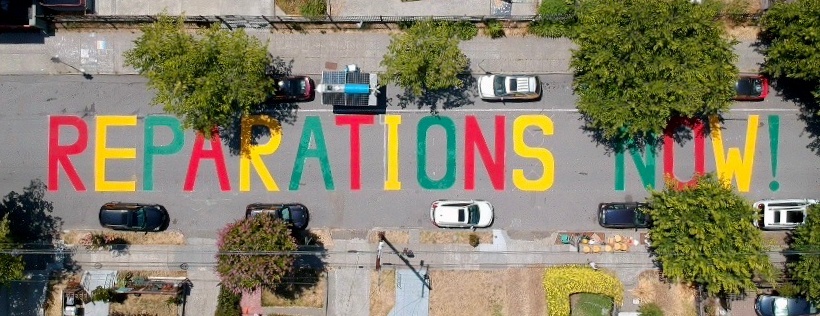In the News June 14
Demands for Reparations Increase in the United States
California Documents 170 Years of “Systemic Discrimination” Against Black People

Berkeley, California, 2020
California’s Reparations Task Force for Black Americans released its initial report June 1, documenting 170 years of systemic discrimination by the state. California became a state in 1850.
“Segregation, racial terror, harmful racist neglect, and other atrocities in nearly every sector of civil society have inflicted harms, which cascade over a lifetime and compound over generations,” the report said. It also called for “comprehensive reparations” for those harmed by that history of government-sanctioned racism and oppression. It calls for creation of a state government office to address “past harms” and “prevent future harms,” and to put in place a reparations program.
The 492-page report provides recommendations to begin those reparations, such as free college tuition and various other non-cash means.
It remains to be seen if any of the recommendations, including potential cash payments, will be implemented. California currently has a budget surplus of about $97.5 billion, of which even a portion is sufficient to begin a program of reparations.
The task force has called for “descendants of African Americans enslaved in the U.S. or of free Black people living in the country before the end of the 19th century” to be included. It heard testimony describing the extent to which federal, state, and corporate actions led to continued racist discrimination against Black people in “almost every aspect of life” after slavery was abolished.
The report speaks to the present-day wealth gap between Black and white people in California and the rest of the country, documenting that it is the direct result of slavery, Jim Crow laws, government segregation using redlining and the accompanying “separate and unequal” schools, political disenfranchisement, greater policing and brutality and other government laws and actions that target Black people.
The report also speaks to California’s history, while not being a slave state, of still having about 1,500 enslaved people in the state in the 1850s and of having a fugitive slave law that required the return of enslaved people who sought freedom there.
The report also cites the extensive history of “sundown towns” in California that prohibited Black people from living within their boundaries long after the system of slave labour was ended by the militant struggle of the slaves themselves, and workers and farmers south and north. These “sundown towns” included many communities just outside of Los Angeles and San Francisco.
It also documents the history of urban renewal and highway projects that dismantled once thriving Black neighbourhoods such as San Francisco’s Fillmore district, effectively destroying generations of communities with their culture and established small businesses and social life, as well as land and home ownership.
The same history and present government racism exists across the country.
Organizations and activists across the country have long been demanding reparations for U.S. crimes of slavery and racist attacks, lynchings, the modern day genocide of mass incarceration, continued segregation, and the theft of land and homes using urban renewal and other federal and state-based actions still taking place across the country.
Many people appreciate the factual documentation provided by the California report and its call for reparations. But most have little confidence the state will actually deliver and are organizing to step up their efforts, nationally and on state levels to secure their demands.
TML Daily, posted June 14, 2022.

|

|

